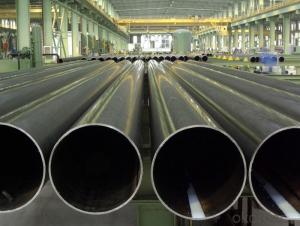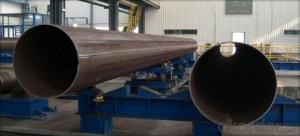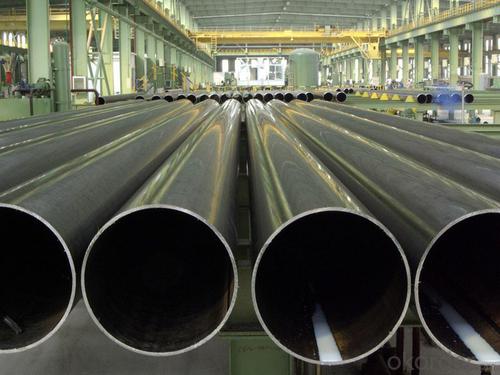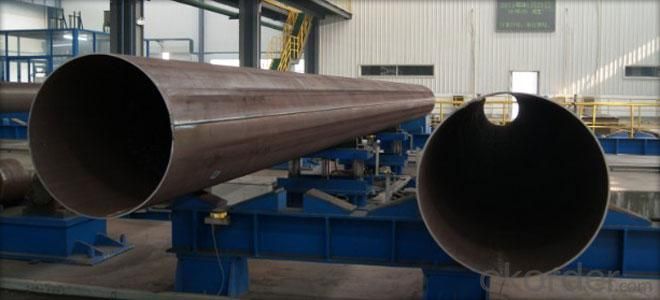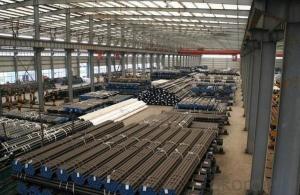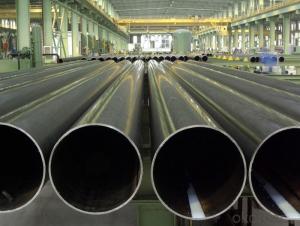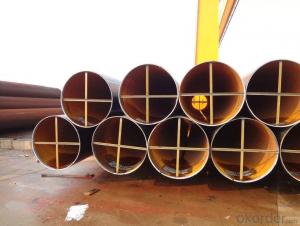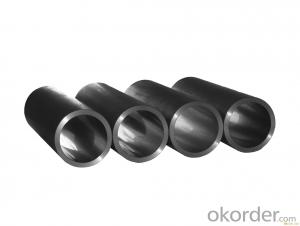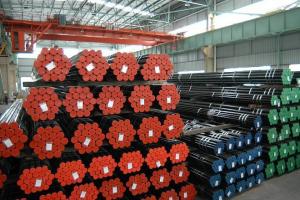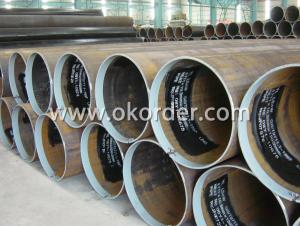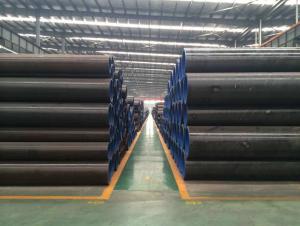Longitudinal Submerged Arc Welded Steel Pipe API 5L
- Loading Port:
- Tianjin
- Payment Terms:
- TT OR LC
- Min Order Qty:
- 25 m.t.
- Supply Capability:
- 10000 m.t./month
OKorder Service Pledge
OKorder Financial Service
You Might Also Like
1、Structure of Longitudinal Submerged Arc Welded Steel Pipe API 5L:
To be used for conveying gas, water, and petroleum for oil and gas industries.
2、Main Features of the Longitudinal Submerged Arc Welded Steel Pipe API 5L:
• High manufacturing accuracy
• High strength
• Small inertia resistance
• Strong heat dissipation ability
• Good visual effect
• Reasonable price
3、Longitudinal Submerged Arc Welded Steel Pipe API 5L Specification:
Standard | GB, DIN, ASTM ASTM A106-2006, ASTM A53-2007 |
Grade | 10#-45#, 16Mn 10#, 20#, 45#, 16Mn |
Thickness | 8 - 33 mm |
Section Shape | Round |
Outer Diameter | 133 - 219 mm |
Place of Origin | Shandong, China (Mainland) |
Secondary Or Not | Non-secondary |
Application | Hydraulic Pipe |
Technique | Cold Drawn |
Certification | API |
Surface Treatment | factory state or painted black |
Special Pipe | API Pipe |
Alloy Or Not | Non-alloy |
Length | 5-12M |
Outer Diameter | 21.3-610mm |
Grade | 20#, 45#, Q345, API J55, API K55, API L80, API N80, API P110, A53B |
Standard | ASME, ASTM |
1) Material:20#(ASTM A 106/A53 GRB.API5LGRB,GB),45#,16Mn,10#.
2) Specification range:OD:21.3-610mm,WT:6-70mm,length:6-12m or according to the requirement of clients.
3) Excutive standards:GB,ASME API5L.ASTM A 106/A53,Despite of the above standards,we can also supply seamless steel pipe with standard of DIN,JIS,and so on,and also develop new products according to the requirements of our clients!
4) Surface:black lacquered,varnish coating or galvanized.
5) Ends:Beveled or square cut,plastic capped,painted.
6) Packing:bundles wrapped with strong steel strip,seaworthy packing.
4、Packaging & Delivery
Packaging Details: | seaworthy package,bundles wrapped with strong steel strip |
Delivery Detail: | 15-30days after received 30%TT |
5、FAQ of Longitudinal Submerged Arc Welded Steel Pipe API 5L:
①How is the quality of your products?
Our products are manufactured strictly according to national and internaional standard, and we take a test
on every pipe before delivered out. If you want see our quality certifications and all kinds of testing report, please just ask us for it.
Guaranteed: If products’ quality don’t accord to discription as we give or the promise before you place order, we promise 100% refund.
②How about price?
Yes, we are factory and be able to give you lowest price below market one, and we have a policy that “ for saving time and absolutely honest business attitude, we quote as lowest as possible for any customer, and discount can be given according to quantity”,if you like bargain and factory price is not low enough as you think, just don’t waste your time.Please trust the quotation we would give you, it is professional one.
③Why should you chose us?
Chose happens because of quality, then price, We can give you both.Additionally, we can also offer professional products inquiry, products knowledge train(for agents), smooth goods delivery, exellent customer solution proposals.Our service formula: good quality+good price+good service=customer’s trust
SGS test is available, customer inspection before shipping is welcome, third party inspection is no problem
- Q: How are steel pipes used in desalination plants?
- Steel pipes are used in desalination plants to transport water, brine, and chemicals throughout the facility. They are highly durable and corrosion-resistant, making them ideal for handling the high-pressure and corrosive nature of the desalination process. Steel pipes ensure efficient and reliable water distribution, contributing to the overall effectiveness of desalination plants in converting seawater into fresh water.
- Q: How are steel pipes used in the manufacturing of power plants?
- Steel pipes are commonly used in the manufacturing of power plants for various purposes such as transporting fluids, gases, and steam. They are utilized for the construction of pipelines that carry water, fuel, and coolant to different parts of the power plant. Additionally, steel pipes are employed in the creation of boiler tubes and heat exchangers, which play a crucial role in the generation of steam and transfer of heat in power plants.
- Q: What's the difference between straight steel pipe and seamless steel pipe?
- Observe whether there is weld seam. Welded pipe without treatment, there are obvious weld, there are bulges, like scars. A better point will shave off the weld, but there is a distinct difference between the eye and the eye. Also a small number of pipe will be processed after cold rolling, surface roughness and accuracy are relatively high, may be counterfeit seamless pipe sales. Careful observation will still show that the pipe wall will have a continuous spiral, metal luster slightly brighter, that is, the original welding seam, metallographic structure and other parts of the difference. To tell the truth, the layman would have to observe that it might be a little difficult.
- Q: What are the different sizes of steel pipes available?
- Steel pipes are available in a wide range of sizes, ranging from small diameters of around 0.5 inches to large diameters of up to 72 inches or more. The specific sizes of steel pipes vary depending on their intended use and application, with common sizes falling within the range of 1/8 inch to 36 inches in diameter.
- Q: How are steel pipes used in the manufacturing of storage tanks?
- Steel pipes are commonly used in the manufacturing of storage tanks due to their high strength, durability, and resistance to corrosion. These pipes are typically used as the main structural component of the tank, providing the necessary strength to support the weight of the stored materials. Additionally, steel pipes can be easily welded together, allowing for the construction of large, seamless tanks that can hold various liquids or gases. Overall, steel pipes play a crucial role in ensuring the integrity and longevity of storage tanks.
- Q: What is the role of steel pipes in sewage systems?
- The role of steel pipes in sewage systems is to provide a durable and reliable means of transporting wastewater and sewage from homes, businesses, and other sources to treatment plants or disposal sites. Steel pipes are known for their strength, corrosion resistance, and longevity, making them suitable for withstanding the harsh and corrosive nature of sewage. They are capable of handling high-pressure flows and can withstand the weight and pressure of the surrounding soil. Additionally, steel pipes are often used in larger diameter applications due to their ability to carry larger volumes of sewage efficiently.
- Q: How are steel pipes used in the pharmaceutical industry?
- Steel pipes are used in the pharmaceutical industry for various purposes, including the transportation of liquids, gases, and chemicals, as well as for the distribution of water and steam. They provide a reliable and durable solution for the safe and efficient transfer of pharmaceutical products within manufacturing facilities and during distribution processes.
- Q: Is the diameter of the steel tube indicated by the outer diameter by the wall thickness or by the inside diameter by the wall thickness?
- 1, DN refers to the nominal diameter of the pipe, the outer diameter and diameter of the average. The value of DN, the value of =De, the thickness of -0.5* tube wall. Note: This is neither outer diameter nor inner diameter. Water and gas transmission pipe (galvanized steel pipe or non galvanized steel pipe), cast iron pipe, steel plastic composite pipe and polyvinyl chloride (PVC) pipe, etc., shall be marked with nominal diameter "DN" (such as DN15, DN50).2, De mainly refers to the pipe diameter, PPR, PE, PP pipe diameter, generally use the De label, are marked as outer diameter and thickness of the form, De25 * 3.3 and D generally refer to the inner diameter of the pipe.4, d concrete pipe diameter. Reinforced concrete (or concrete) pipe, clay pipe, acid resistant ceramic tube, pipe and other pipe diameter gangwa, should be said with inner diameter of D (such as D230, D380 etc.)5, Phi represents the diameter of the ordinary circle. It can also indicate the outer diameter of the pipe, but it should be multiplied by the wall thickness at this time. Such as: Phi 25 x 3, indicating outer diameter 25mm, wall thickness of 3mm pipe.
- Q: What are the dimensions of steel pipes?
- The dimensions of steel pipes can vary greatly depending on the specific application and industry requirements. However, common dimensions for steel pipes include diameter, wall thickness, and length. Diameter can range from a few millimeters to several meters, while wall thickness can vary from thin-walled pipes to thick-walled pipes. Lengths can be customized based on project needs, but standard lengths are typically 6 meters or 20 feet.
- Q: How are steel pipes used in the manufacturing of irrigation systems?
- Steel pipes are commonly used in the manufacturing of irrigation systems due to their durability, strength, and ability to withstand high water pressure. These pipes are used to transport water from the source to the farmland or fields, ensuring efficient and reliable irrigation. Additionally, steel pipes are corrosion-resistant, making them ideal for use in various environmental conditions.
Send your message to us
Longitudinal Submerged Arc Welded Steel Pipe API 5L
- Loading Port:
- Tianjin
- Payment Terms:
- TT OR LC
- Min Order Qty:
- 25 m.t.
- Supply Capability:
- 10000 m.t./month
OKorder Service Pledge
OKorder Financial Service
Similar products
Hot products
Hot Searches
Related keywords
